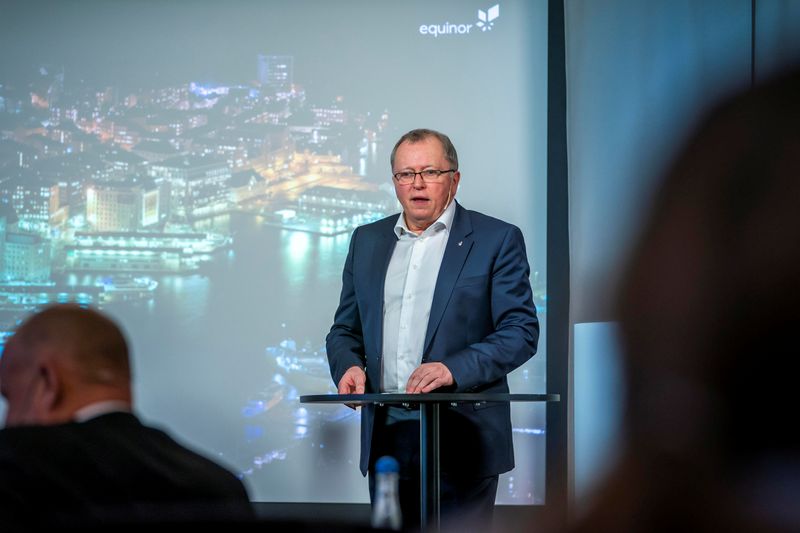By Victoria Klesty and Terje Solsvik
OSLO (Reuters) - Norway's Equinor (OL:EQNR) plans to cut greenhouse gas emissions from its domestic operations by 40% this decade and to near zero by 2050, potentially allowing the country to keep pumping crude even as it works to meet international climate obligations.
CEO Eldar Saetre told Reuters the plan could also give the state-controlled company a competitive advantage as the industry faces rising costs for climate warming emissions.
Norway is western Europe's top oil and gas exporter. It has used the proceeds from these sales to build the world's largest sovereign wealth fund, worth more than $1 trillion.
Equinor and its partners plan to invest around 50 billion crowns (4.33 billion pounds) by 2030 to cut CO2 emissions to an annual rate of about 8 million tonnes at offshore fields and onshore plants in Norway from 13 million in 2018, the company said.
Equinor's targets only cover emissions related to its operations and not those from the products it sells, drawing criticism from some environmental groups.
Spain's Repsol (MC:REP) said last month it aimed to reduce its CO2 emissions to net zero by 2050 at a cost of $5.3 billion, including those from its products.
RBC Capital Markets analyst Biraj Borkhataria said Equinor's CO2 emissions per barrel of oil equivalent were already low - at 9 kg against an industry average of 18 kg and that it made sense for the company not to include emissions from its products given its lack of downstream - retail and distribution - operations.
Equinor said initial cuts would primarily come through replacing electricity from gas turbines with renewable energy at major installations, including offshore wind turbines and hydroelectric power via subsea cables.
Later, they will come from measures such as consolidating infrastructure and developing new technologies, it added.
"We are convinced that (cutting) the CO2 emissions from the production process is going to be a competitive factor, increasingly so in the future," Saetre said on the sidelines of a news conference.
"There will be regulation of these emissions and also taxes associated with it ... it is mainly about avoiding cost and creating a competitive situation."
Oil and natural gas generate about half of Norway's export revenue and some 25% of the country's CO2 emissions.
PARIS AGREEMENT
Under the 2015 Paris climate agreement, almost 200 governments agreed to cut emissions to help avert more floods, droughts and rising sea levels.
Equinor has argued that slashing emissions from the production process should allow it to continue to pump for decades to come, even though the final consumption of its oil and gas will continue to emit greenhouse gases.
The company has said it expects Norway's petroleum output, based on current resources, to fall by more than half by 2050, but environmental campaigners say this is not enough.
"An oil company with targets for its own emissions, and not for its products, is like a cigarette producer that promises that all employees will quit smoking, while increasing cigarette production," said Mark Van Baal, founder of investor advocacy Follow This.
Saetre said oil and gas would still be needed in the coming decades.

"I have seen no (climate) scenario that takes out oil and gas completely, so there will be oil and gas - significantly less than today, but the consumption of what it will be used for will be slightly different," he said.